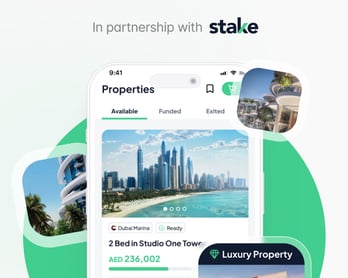Regulation Crowdfunding (Reg CF) grants ordinary investors access to a new asset class—by investing as a “crowd.” Before 2016, this wasn’t possible—many offerings were restricted to only accredited (wealthy) investors or required issuers to comply with too many regulations and reporting requirements to make a crowdinvesting offering worthwhile. But now, since “Title III” of the Jumpstart Our Business Startups (JOBS) Act passed, everyone plays on the same field.
Explore our Reg CF and Reg A investment offerings
What makes Reg CF different?
Regulation Crowdfunding for securities is unique because it brings capitalism back to its roots. When we're talking about "equity" or "securities" crowdfunding, it allows investors to become eligible “angels” and invest from the beginning, rather than having to wait for a company to go public. This was once the privilege of high-net-worth (or high-income) investors.
What’s more, investors become members of entrepreneurial communities. This added element of exclusivity (via inclusivity) invites everyone to become more involved with the company’s process—and if their investment succeeds—part of something big.
Perhaps FINRA (Financial Industry Regulatory Authority) summed it up best when they said:
“A vibrant market is at its best when it works for everyone.”
Benefits of Regulation Crowdfunding
For investors:
You can invest early, with little: you get in on the ground floor, with a minimum investment that is typically smaller than that of a regulation A crowdfunding offering.
You may be less likely to get shut out of deals: the new maximum amount that startups can raise (from $1.07M to $5M) will allow more people to invest in offerings.
You can invest in the future you believe in: when you invest in startups, you invest in founders whose vision you support and innovations that may change the world.
You are supporting the needs of small businesses and spurring job creation: small businesses create 64% of new jobs annually in the US.
You may make money: as an early investor, your success is their success, so choose companies that you believe can be game-changers.
For issuers:
They can raise operating capital while building a loyal community: issuers can finance their startups from investors that believe in their product or service—creating a following of brand ambassadors.
They can stop worrying about having connections with VCs: venture capital firms may try to control valuations, board seats, and other factors that interfere with the founder’s vision.
They can launch “reservation campaigns”: companies can now gauge the level of the public’s interest before going through the time and expense of filing an offering statement with the SEC. This may help decrease failure rates and reduce wasted resources. However, issuers should note that this is a new law under SEC guidelines and is subject to some restrictions.
Turns customers into investors: the advent of new backers gives businesses a much greater potential to raise capital from the public – which comprises the “other,” "non-accredited" 90% of the population.
For both:
Diversity and inclusion are no longer ignored: Women-owned businesses, minority founders, and even companies that lie outside of major metropolitan areas have been historically underfunded by traditional sources like banks, VCs, and private equity firms. Reg CF turns this unfair status quo on its head, allowing the people to vote with their wallets, and get behind the companies (and the people) they believe in.
Reg CF rules and regulations
For investors:
Must be at least 18 years of age.
Must disclose identifying information, as well as net worth and annual income.
Should be in a financial position that allows for the risk of losing all or part of your investment.
Generally require a holding period of at least 12 months after the campaign closes, with a few exceptions. This is different from being a shareholder in a public company, where you can sell your shares to someone willing to buy them from you on an exchange. Investments are generally illiquid and cannot be traded even after the holding period ends. State-level anti-fraud legislation (blue sky laws) may also apply.
For issuers:
Must provide complete and accurate disclosures to the public for investors to make informed decisions or risk severe legal consequences.
All transactions must take place online through an SEC-registered, FINRA member intermediary (broker-dealer or a funding portal), such as Republic.
Limit the amount individual non-accredited investors can invest across all crowdfunding offerings in a 12-month period.
You are required to file a public disclosure of information with the SEC, investors, and the intermediary. This includes detailed information such as risk factors, capitalization tables, and financial statements for the previous two years. There are also continuing reporting requirements post-offering.
Other requirements include:
Must be a US company
Must pass a bad actor check on all officers, directors, and managers, as well as an intermediary's due diligence check, such as the vetting that Republic undertakes
Subject to anti-fraud and anti-manipulation provisions of the securities laws
Common types of investments
Equity—common and preferred shares
Both common and preferred shares grant investors a financial stake in a company. They represent a basic form of equity—an ownership interest in the business. Most commonly, in private companies, early-stage investors receive preferred stock, while founders and employees hold common stock.
Equity offered in a Reg CF is significantly less liquid than publicly-traded stock, which is freely tradable immediately after purchase. It also comes with less information for investors due to lighter reporting requirements, which the issuer in certain situations can terminate.
When a company is sold, everyone generally gets a portion of the proceeds, but the allocation depends on the rights tied to the share type.
Common shares get voting rights, so their holders can participate in a company's decisions. On the other hand, preferred stockholders are prioritized when a company's income is distributed as dividends.
In the event that a company goes bankrupt or has to be liquidated entirely, preferred shareholders get their money back before common shareholders. This is obviously a huge benefit. However, in some cases, common shareholders may be left with little or no return after preferred stockholders are paid out.
Membership units
Membership units represent an investor’s ownership stake in a limited liability company. Investors (members) hold a membership interest, which gives the investor profit and voting interests in the LLC, which can be altered by the terms of the contract.
Unlike corporations, LLCs:
Distribute membership interests in any manner they prefer, rather than ranking members by their total contributions.
Add the investor’s name to a ledger rather than issuing stock certificates.
If profitable, the Manager (like a President or Chairperson) has the power to make distributions to members. This is similar to dividends made to stockholders.
If the company is sold or merged, members will receive cash or equity as consideration for their ownership rights.
SAFE—Simple Agreement for Future Equity
A SAFE gives investors the right to own equity in the future, contingent upon a startup selling shares down the road.
Young startups use these instruments to delay the painful job of figuring out how much a startup is worth (valuation) when raising money. SAFEs can also be cheaper and easier to complete than other investment rounds, which can require a lot of time and money.
Each agreement is different, but they all share similar basics:
For example, a “trigger” is typically when the issuer sells priced shares. This initiates the stock to be delivered from the issuer to the investor.
Unlike equity, shares are not valued when the SAFE is signed. Investors and issuers share a vested interest in how future shares will be issued, so they negotiate terms while deferring valuation.
The investor receives stock in the company at a later date.
The investor shares in the company's upside (i.e., the company's growth in value) between the time the SAFE is signed and the trigger event, such as an acquisition, sale of assets, or an IPO.
Crowd SAFE
Designed with the essential elements of a SAFE, Republic’s Crowd SAFE focuses on investment campaigns that attract large numbers of investors. This helps to reduce operational inefficiencies when securing capital for the next round of raising but does not require the business to convert the agreement into equity until a trigger event occurs.
Investors using the Crowd SAFE invest for a chance to earn a return, in either equity or a payout, if the company is acquired, sells all its assets or goes public.
Debt
A loan between an investor and a company:
Often called bonds or debentures.
The investor (lender) lends money to a company. The company then has to pay the lender back within a predetermined amount of time.
The investor makes money in the form of interest payments, paid periodically by the company.
Convertible notes
Much like a debt offering, but with a twist:
The investor buys debt from a company, earns interest for a predetermined amount of time, then
The debt either converts to equity, or
The money is paid back in cash
Revenue sharing note
This is a type of security often used by our local investing offerings. A business agrees to pay you a percentage of their gross revenue every month until the initially agreed-upon “repayment amount” is returned. Payments may vary (due to fluctuations in revenue); there may be months where there is no revenue at all.
Term Note
Think of a term note like a car loan, except, in this case, you’re the lender. A business agrees to pay you a set percentage (interest) on your investment for the duration (term) of the loan. Payments are fixed each month for a predetermined number of months.
Investment limits
For investors:
Accredited: No investment limits (see new accredited investor qualifiers here)
Non-accredited: Over the course of a year, the maximum a non-accredited investor can invest across all issuers operating under Regulation Crowdfunding is:
-
If either the investor's annual income or net worth is less than $124,000: the greater of $2,500, or 5 percent of the greater of the investor’s annual income or net worth.
Ex: If your income (or net worth, whichever is greater) is $75,000, you can invest up to $3,750 (5% of $75k) in total offerings.
-
If both the investor’s annual income and net worth are equal to or more than $124,000: 10% of the greater of the investor’s annual income or net worth, though the amount invested cannot exceed $124,000.
Ex: If your net worth is $500,000 and your income is $108,000, you can invest a maximum of $50,000 (10% x $500,000, because your net worth is the greater number).
For issuers:
In any twelve-month period, issuers can raise up to $5 million* (increased from $1.07 million in March of 2021).
The issuer has to set a minimum investment size they will accept during the campaign and can choose to limit the maximum investment amount.
*Any deal over $1.235 million will require audited financial statements.
How to invest under Regulation Crowdfunding
It’s important to do your due diligence when deciding what Regulation Crowdfunding platform you choose to do business with. Once you do that, you need to make sure the companies you are investing in are ones you trust, believe in and want to be a part of down the road.
Here are just a few things to consider before investing:
Expect to hold your investment long-term
Diversification is key to a balanced portfolio
Conduct your own research from trusted sources
-
Know the risks and terms of the deals you invest in, more specifically:
Most startups will fail. This is why it’s important to spread your risk by investing in multiple offerings across different industries.
The past has nothing to do with the future—just because a founder was successful with a previous company does not mean they will be with their current startup.
Expect changes, frequently. Startups change plans a lot, and they typically don’t need your permission to do so. Get used to the "pivot."
Your stake in the company may become “diluted.” When this happens, your ownership interest becomes watered down, which decreases the value of your stake with each new investment.
Republic takes a lot of worry out of getting started with your private investing journey.
Explore our investment offerings
This educational article is provided by Republic to help its users understand this area of the market, it should not be construed as investment advice as it is impersonal, disinterested and was produced by Republic for Republic’s users, without remuneration received or expected.
Regulation Crowdfunding investor education



 Oops! We couldn’t find any results...
Oops! We couldn’t find any results...








2 comments